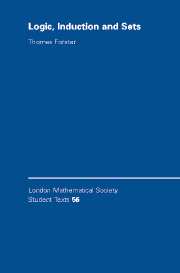Introduction
Published online by Cambridge University Press: 05 June 2012
Summary
In the beginning was the Word, and the Word was with God, and the Word was God. The same was also in the beginning with God.
John's Gospel, ch 1 v 1Despite having this text by heart I still have no idea what it means. What I do know is that the word that is translated from the Greek into English as ‘word’ is λογοσ, which also gave us the word ‘logic’. It is entirely appropriate that we use a Greek word since it was the Greeks who invented logic. They also invented the axiomatic method, in which one makes basic assumptions about a topic from which one then derives conclusions.
The most striking aspect of the development of mathematics in its explosive modern phase of the last 120-odd years has been the extension of the scope of the subject matter. By this I do not mean that mathematics has been extended to new subject areas (one thinks immediately of the way in which the social sciences have been revolutionised by the discovery that the things they study can be given numerical values), even though it has, nor do I mean that new kinds of mathematical entities have been discovered (imaginary numbers, vectors and so on), true though that is too. What I mean is that in that period there was a great increase in the variety of mathematical entities that were believed to have an independent existence.
Information
- Type
- Chapter
- Information
- Logic, Induction and Sets , pp. 1 - 4Publisher: Cambridge University PressPrint publication year: 2003
